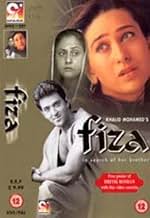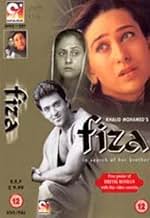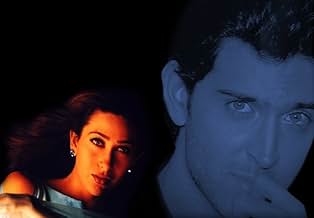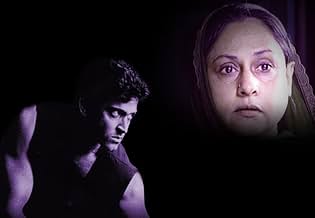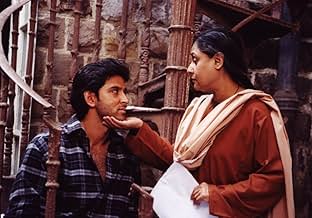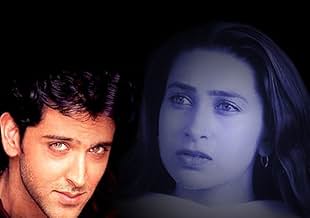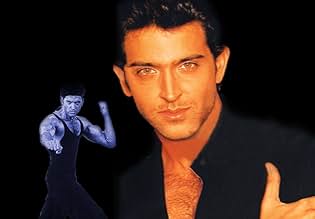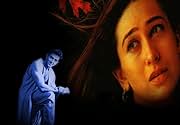NOTE IMDb
6,0/10
4,6 k
MA NOTE
Ajouter une intrigue dans votre langueIn 1993 Fiza's brother Aman disappears during the riots in Mumbai. In 1999 Fiza is tired of waiting and goes looking for him.In 1993 Fiza's brother Aman disappears during the riots in Mumbai. In 1999 Fiza is tired of waiting and goes looking for him.In 1993 Fiza's brother Aman disappears during the riots in Mumbai. In 1999 Fiza is tired of waiting and goes looking for him.
- Récompenses
- 12 victoires et 25 nominations au total
Shabana Raza
- Shenaz
- (as Neha)
Johny Lever
- Laughing Club Comic
- (as Jhonny Lever)
Shivaji Satam
- Mr. Sawant
- (as Shivaaji Satam)
Manoj Bajpayee
- Murad Khan (Guest Appearance)
- (as Manoj Bajpai)
Histoire
Le saviez-vous
- AnecdotesThe film was set to be a artistic film. But Khalid Mohammed decided to commercialize the film due to pressure from the distributors. Karishma Kapoor had a dance number added. Johnny Lever park scene was added. More songs were added. Hrithik's role increased including his work out and more songs.
- GaffesThe dead mother shows eye movement in her first shot as a body.
- ConnexionsReferenced in SRF DOK: Bollywood im Alpenrausch (2000)
- Bandes originalesAaja Mahiya
Written by Gulzar (as Sampooran Singh Gulzar)
Composed by Anu Malik
Performed by Udit Narayan and Alka Yagnik
Courtesy of Tips Cassettes & Records Co.
Commentaire à la une
Kahalid Mohamed's Fiza is one gem of a movie. This is a realistic portrayal of the consequences of war, violence, hatred, and the dehumanisation of people at times of a war. Families losing people, parents losing sons, sisters losing brothers and so on. This film is about Fiza, a smart, intelligent and strong young Muslim woman who lost her brother Aman seven years ago during the 1993 Mumbai riots. He disappeared and no one knows where he is. Meanwhile, she and her suffering mother live a poor and ordinary lifestyle. Fiza decides to go in search of her brother and is well determined to find him by any means possible. She meets different people on her way and finally meets her brother, just to find out that he is not the simple young man he used to be.
The film is brilliantly narrated, well pictured, and quite authentically portrayed and acted, so I believe most people will find it easy to relate to the story, to the characters and their different tribulations. The dialogues are well-written and they often waver between the realistic and the utterly theatrical, but that is really a nice sort of balance as far as I'm concerned. The people Fiza meets on her way represent the variety of people in our society: the bad, the good, the deceived, the corrupted, the ugly and the generous. The story changes drastically when Aman enters the picture, it becomes lighter and does lend some relief after the more intense first half. But it's just for a little while. The film soon becomes far more dramatic and intense with some shocking twists. Some of the proceedings are heart-breaking and powerful.
Karisma Kapoor delivers one of the finest performances the Hindi screen has seen. What a magnificent performance. She is natural, sincere, beautiful, charismatic, charming, and performs with great nerve, depth and conviction in every frame. She makes the feisty Fiza an unforgettable woman. One particular scene that must be noted is the one in which Fiza breaks down and starts literally mourning post a very tragic incident (see the film to understand). It is an extremely powerful and heart-rending moment of real pain and despair.
Jaya Bachchan, in one of her best performances, is amazingly compelling and moving as the hurt yet vivacious and lively Nishatbi. She displays maternal pain and later helplessness and despair with amazing depth and pathos. Her silence, as one can expect from an actress as skilled as she is, tugs at the heartstrings. Hrithik Roshan is impressively competent. His role is very complex and he plays it with complete dedication even if sometimes something is missing and it feels too starry. It's a very good performance overall, though he obviously does not create the same kind of impact as his female co-stars. Other cast members, including Asha Sachdev, Manoj Bajpai and Neha, support very well. Asha Sachdev in particular stands out in a relatively small role. She provides great comic relief with her natural sense of humour. There is also a funny sequence with Johnny Lever imitating different Indian stars.
The music is fantastic and helps to relieve the otherwise extremely serious proceedings. Sushmita Sen's number "Mehboob Mere" was effective, but the one I liked the most is Karisma's "Aankh Milaoongi" dance number. She danced very well and I found the number quite alluring despite its evident irrelevance within this film. "Aaja Mahiya" and "Tu Fiza Hai" are very melodious and romantic.
Khalid Mohammed, a well-known film critic, must have stored the idea for a real and artistic film for a long time. His attempts to draw balance between the mainstream and the so-called art cinema within this film, are a little weird at times but still, this is a wonderfully made film in all aspects. It is authentic, not one-sided, it conveys emotion, fun, entertainment, tears, pain, without going to any extremes of unnecessary drama. The story is interesting and, combined with the good acting, manages to keep the audience, and I'm speaking for myself, constantly engaged. The cinematography is fantastic, the action is not overdone (okay maybe just sometimes), and the background score is exceptional. The ending is shocking but contributes to the drama. This film is highly recommended for all those who love Bollywood films, or realistic films, or just films that make sense.
The film is brilliantly narrated, well pictured, and quite authentically portrayed and acted, so I believe most people will find it easy to relate to the story, to the characters and their different tribulations. The dialogues are well-written and they often waver between the realistic and the utterly theatrical, but that is really a nice sort of balance as far as I'm concerned. The people Fiza meets on her way represent the variety of people in our society: the bad, the good, the deceived, the corrupted, the ugly and the generous. The story changes drastically when Aman enters the picture, it becomes lighter and does lend some relief after the more intense first half. But it's just for a little while. The film soon becomes far more dramatic and intense with some shocking twists. Some of the proceedings are heart-breaking and powerful.
Karisma Kapoor delivers one of the finest performances the Hindi screen has seen. What a magnificent performance. She is natural, sincere, beautiful, charismatic, charming, and performs with great nerve, depth and conviction in every frame. She makes the feisty Fiza an unforgettable woman. One particular scene that must be noted is the one in which Fiza breaks down and starts literally mourning post a very tragic incident (see the film to understand). It is an extremely powerful and heart-rending moment of real pain and despair.
Jaya Bachchan, in one of her best performances, is amazingly compelling and moving as the hurt yet vivacious and lively Nishatbi. She displays maternal pain and later helplessness and despair with amazing depth and pathos. Her silence, as one can expect from an actress as skilled as she is, tugs at the heartstrings. Hrithik Roshan is impressively competent. His role is very complex and he plays it with complete dedication even if sometimes something is missing and it feels too starry. It's a very good performance overall, though he obviously does not create the same kind of impact as his female co-stars. Other cast members, including Asha Sachdev, Manoj Bajpai and Neha, support very well. Asha Sachdev in particular stands out in a relatively small role. She provides great comic relief with her natural sense of humour. There is also a funny sequence with Johnny Lever imitating different Indian stars.
The music is fantastic and helps to relieve the otherwise extremely serious proceedings. Sushmita Sen's number "Mehboob Mere" was effective, but the one I liked the most is Karisma's "Aankh Milaoongi" dance number. She danced very well and I found the number quite alluring despite its evident irrelevance within this film. "Aaja Mahiya" and "Tu Fiza Hai" are very melodious and romantic.
Khalid Mohammed, a well-known film critic, must have stored the idea for a real and artistic film for a long time. His attempts to draw balance between the mainstream and the so-called art cinema within this film, are a little weird at times but still, this is a wonderfully made film in all aspects. It is authentic, not one-sided, it conveys emotion, fun, entertainment, tears, pain, without going to any extremes of unnecessary drama. The story is interesting and, combined with the good acting, manages to keep the audience, and I'm speaking for myself, constantly engaged. The cinematography is fantastic, the action is not overdone (okay maybe just sometimes), and the background score is exceptional. The ending is shocking but contributes to the drama. This film is highly recommended for all those who love Bollywood films, or realistic films, or just films that make sense.
- Peter_Young
- 5 juil. 2009
- Permalien
Meilleurs choix
Connectez-vous pour évaluer et suivre la liste de favoris afin de recevoir des recommandations personnalisées
- How long is Fiza?Alimenté par Alexa
Détails
- Date de sortie
- Pays d’origine
- Site officiel
- Langues
- Aussi connu sous le nom de
- В поисках брата
- Lieux de tournage
- Sociétés de production
- Voir plus de crédits d'entreprise sur IMDbPro
Box-office
- Budget
- 1 000 000 $US (estimé)
- Montant brut aux États-Unis et au Canada
- 596 591 $US
- Week-end de sortie aux États-Unis et au Canada
- 374 708 $US
- 10 sept. 2000
- Montant brut mondial
- 596 591 $US
- Durée2 heures 50 minutes
- Couleur
- Mixage
- Rapport de forme
- 2.35 : 1
Contribuer à cette page
Suggérer une modification ou ajouter du contenu manquant



